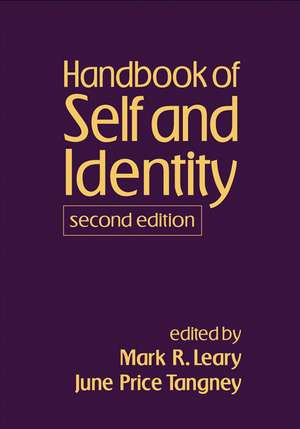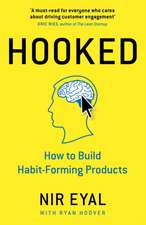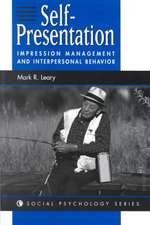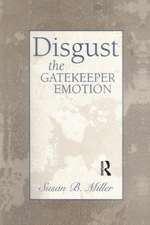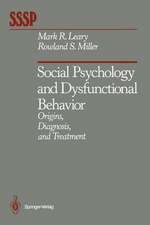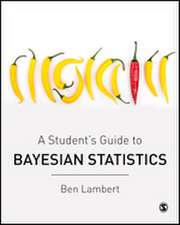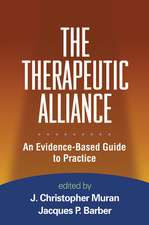Handbook of Self and Identity, Second Edition
Editat de Mark R. Leary, June Price Tangneyen Limba Engleză Hardback – 26 apr 2012
New to This Edition
*Incorporates significant theoretical and empirical advances.
*Nine entirely new chapters.
*Coverage of the social and cognitive neuroscience of self-processes; self-regulation and health; self and emotion; and hypoegoic states, such as mindfulness.
| Toate formatele și edițiile | Preț | Express |
|---|---|---|
| Paperback (1) | 502.01 lei 22-36 zile | +48.14 lei 5-11 zile |
| Guilford Publications – 4 mar 2014 | 502.01 lei 22-36 zile | +48.14 lei 5-11 zile |
| Hardback (1) | 770.76 lei 43-57 zile | |
| Guilford Publications – 26 apr 2012 | 770.76 lei 43-57 zile |
Preț: 770.76 lei
Preț vechi: 846.99 lei
-9% Nou
Puncte Express: 1156
Preț estimativ în valută:
147.53€ • 160.31$ • 124.01£
147.53€ • 160.31$ • 124.01£
Carte tipărită la comandă
Livrare economică 21 aprilie-05 mai
Preluare comenzi: 021 569.72.76
Specificații
ISBN-13: 9781462503056
ISBN-10: 1462503055
Pagini: 754
Ilustrații: Illustrations
Dimensiuni: 178 x 254 x 38 mm
Greutate: 1.47 kg
Ediția:Revizuită
Editura: Guilford Publications
Colecția Guilford Press
ISBN-10: 1462503055
Pagini: 754
Ilustrații: Illustrations
Dimensiuni: 178 x 254 x 38 mm
Greutate: 1.47 kg
Ediția:Revizuită
Editura: Guilford Publications
Colecția Guilford Press
Public țintă
Professional Practice & DevelopmentNotă biografică
Mark R. Leary, PhD, is Professor of Psychology and Neuroscience at Duke University. His research focuses on the processes by which people think about and evaluate themselves; the effects of self-reflection on emotion and psychological well-being; and how people are influenced by concerns about how they are perceived and evaluated by others. He is a Fellow of the American Psychological Association, the Association for Psychological Science, and the Society for Personality and Social Psychology, and a recipient of the Lifetime Career Award from the International Society for Self and Identity. Dr. Leary was the founding editor of the journal Self and Identity and is currently Editor of Personality and Social Psychology Review.
June Price Tangney, PhD, is Professor of Psychology at George Mason University. A Fellow of the Society for Personality and Social Psychology and of the Association for Psychological Science, she is Associate Editor of American Psychologist. Dr. Tangney’s primary research interest is the development and implications of moral emotions; her current work focuses on moral emotions among incarcerated offenders. A recipient of George Mason University’s Teaching Excellence Award, she strives to integrate service, teaching, and clinically relevant research in both the classroom and her lab.
Cuprins
1. The Self as an Organizing Construct in the Behavioral and Social Sciences, Mark R. Leary and June Price Tangney
I. Awareness, Cognition, and Regulation
2. Self as Psycho-Social Dynamic Processing System: Toward a Converging Science of Selfhood, Carolyn C. Morf and Walter Mischel
3. Self-Awareness, Charles S. Carver
4. Self, Self-Concept, and Identity, Daphna Oyserman, Kristen Elmore, and George Smith
5. Organization of Self-Knowledge: Features, Functions, and Flexibility, Carolin J. Showers and Virgil Zeigler-Hill
6. Reflected Appraisal through a 21st-Century Looking Glass, Harry M. Wallace and Dianne M. Tice
7. Expandable Selves, Gregory M. Walton, David Paunesku, and Carol S. Dweck
8. Implicit Self and Identity, Thierry Devos, Que-Lam Huynh, and Mahzarin R. Banaji
9. Self-Regulation and the Executive Function of the Self, Roy F. Baumeister and Kathleen D. Vohs
10. Self-Efficacy, James E. Maddux and Jennifer T. Gosselin
11. Multiple Identities within a Single Self: A Self-Determination Theory Perspective on Internalization within Contexts and Cultures, Richard M. Ryan and Edward L. Deci
12. Self-Regulation Failure and Health: Pathways to Mental and Physical Illness, Timothy J. Strauman and Elena L. Goetz
13. Hypo-Egoic Mindsets: Antecedents and Implications of Quieting the Self, Mark R. Leary and Meredith L. Terry
II. Evaluation, Motivation, and Emotion
14. Social Self-Analysis: Constructing and Maintaining Personal Identity, Mark D. Alicke, Corey L. Guenther, and Ethan Zell
15. Contingencies of Self-Worth, Jennifer Crocker and Lora E. Park
16. Self-Protection, Constantine Sedikides
17. Individual Differences in Self-Esteem, Geoff MacDonald and Mark R. Leary
18. Freedom versus Fear Revisited: An Integrative Analysis of the Dynamics of the Defense and Growth of Self, Tom Pyszczynski, Jeff Greenberg, and Jamie Arndt
19. Self-Verification: The Search for Coherence, William B. Swann, Jr., and Michael D. Buhrmester
20. Self and Emotion, Paul J. Silvia and Kari M. Eddington
21. Self-Conscious Emotions, June Price Tangney and Jessica Tracy
III. Interpersonal Behavior and Culture
22. The Relation of Self to Social Perception, David Dunning
23. Social Identity and the Psychology of Groups, Michael A. Hogg
24. Self and Close Relationships, Arthur Aron and Natalie Nardone
25. Self-Presentation, Barry R. Schlenker
26. Contemporary Perspectives on Narcissism and the Narcissistic Personality Type, Frederick Rhodewalt
27. Cultural Models of the Self, Susan E. Cross and Jonathan S. Gore
IV. Physiological, Phylogenetic, and Developmental Perspectives
28. The Two Selves: The Self of Conscious Experience and Its Brain, Stanley B. Klein
29. A Social Neuroscience Perspective on the Self, Jennifer S. Beer
30. Self-Recognition in Animals, Robert W. Mitchell
31. Emerging Self-Processes during Childhood and Adolescence, Susan Harter
Recenzii
"Take the world’s leading authorities on the psychology of the self and ask them to write about what they know best, and you have the Handbook of Self and Identity. Now in its second edition, this remarkable handbook offers the first and last word on this important subject."--Daniel Gilbert, PhD, Department of Psychology, Harvard University
"Building on the strengths of the first edition, the editors have assembled an all-star team of experts to address classic topics and emerging areas of inquiry into the many and varied facets of self and identity. Bringing together individual and social perspectives, this handbook serves as a powerful reminder that self and identity are rooted in biological, social, and cultural contexts, and have far-reaching consequences for how people think, feel, and act as individuals and as members of relationships and groups. Quite simply, this handbook is a 'must read.'"--Mark Snyder, PhD, McKnight Presidential Chair in Psychology, University of Minnesota
"I was tempted to assign nearly every chapter of this volume in my graduate Self and Identity class. Each chapter is cogent, neatly summarizes past work, and provides insights into future directions. The Handbook has been an outstanding text for this course."--Jeffrey Green, PhD, Department of Psychology, Virginia Commonwealth University
-Handbook of Self and Identity is dynamite....Almost every finding relates uncannily to the issues my patients bring to sessions....The editors' care and scrutiny are evident throughout this attractive volume. The book is well-organized, well-indexed, and easy to read.--Psychiatric Services, 12/30/2011ƒƒTerrific. A handbook should provide a comprehensive and current review of the field it covers, and the Handbook of Self and Identity delivers in each respect. This handbook would make a fine introduction in an advanced undergraduate course (assuming knowledgeable and engaged students), and an even better review of the field for graduate students....The book is also valuable to professionals working in the areas of self and identity.--PsycCRITIQUES, 12/30/2011ƒƒThis is a well-written book by influential authors who are experts in this field....It is an important book for researchers and clinicians.--Doody's Reviews, 10/1/2012ƒƒProvides a useful overview for advanced students and researchers interested in the self, and, more important, some needed perspective on the way forward.--PsycCRITIQUES, 12/19/2012ƒƒThis is a very useful collection of essays for the researchers and academicians in philosophy, cognitive science and neuroscience as well as in psychology and especially in social and cognitive psychology....A very timely and valuable contribution to the current interdisciplinary discussions of the self, especially given the recent upsurge in theoretical and empirical interest in self-related topics. I recommend this book for anyone who wants to have a broader understanding of the self and how our identities are shaped in a social, historical, psychological and neurological point of view.--Metapsychology Online Reviews, 2/26/2013"Building on the strengths of the first edition, the editors have assembled an all-star team of experts to address classic topics and emerging areas of inquiry into the many and varied facets of self and identity. Bringing together individual and social perspectives, this handbook serves as a powerful reminder that self and identity are rooted in biological, social, and cultural contexts, and have far-reaching consequences for how people think, feel, and act as individuals and as members of relationships and groups. Quite simply, this handbook is a 'must read.'"--Mark Snyder, PhD, McKnight Presidential Chair in Psychology, University of Minnesota
"I was tempted to assign nearly every chapter of this volume in my graduate Self and Identity class. Each chapter is cogent, neatly summarizes past work, and provides insights into future directions. The Handbook has been an outstanding text for this course."--Jeffrey Green, PhD, Department of Psychology, Virginia Commonwealth University
Descriere
Widely regarded as the authoritative reference in the field, this volume comprehensively reviews theory and research on the self. Leading investigators address this essential construct at multiple levels of analysis, from neural pathways to complex social and cultural dynamics. Coverage includes how individuals gain self-awareness, agency, and a sense of identity; self-related motivation and emotion; the role of the self in interpersonal behavior; and self-development across evolutionary time and the lifespan. Connections between self-processes and psychological problems are also addressed.
New to This Edition
*Incorporates significant theoretical and empirical advances.
*Nine entirely new chapters.
*Coverage of the social and cognitive neuroscience of self-processes; self-regulation and health; self and emotion; and hypoegoic states, such as mindfulness.
New to This Edition
*Incorporates significant theoretical and empirical advances.
*Nine entirely new chapters.
*Coverage of the social and cognitive neuroscience of self-processes; self-regulation and health; self and emotion; and hypoegoic states, such as mindfulness.
